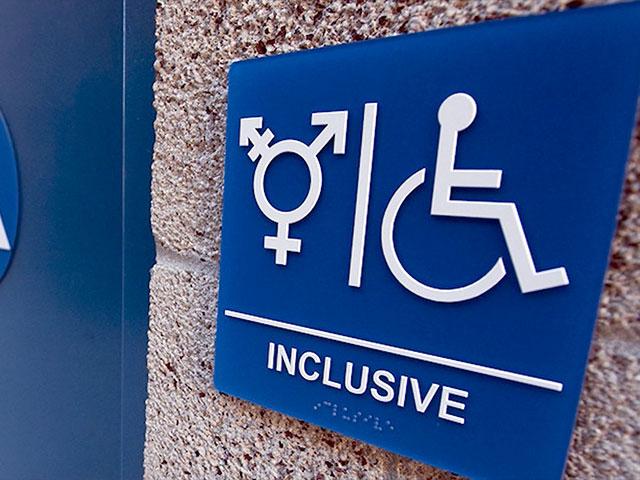Yesterday I received an email from a high school student working on a final project for her English class: a public service announcement. She chose transgender rights and public restrooms as her subject, and she wrote to me to ask if I could answer some questions for her. I was glad to help — and since I thought those same answers might be useful to others, I’ve copied my letter to her below.
Hi [Name],
I’m glad to hear that you’re interested in transgender rights. I think it’s a great topic for your PSA project! I am happy to answer your questions, but I would like you to do something for me in return. When you finish your project, would you send me a copy, or a link to an online version? I’d like to see the results! If you are willing to do that for me, then please feel free to use my answers in your project.
You asked me three questions:
My questions are:
What was going through your mind when you made the change?
Do you have any thing to say to other transgenders?
What do you want people to understand?
In order to answer your questions, I first have to explain a couple of things. In your first question, you asked me about when I “made the change.” I think that what you mean is my medical transition, but this wording is problematic for a few reasons.
First of all, saying “the change” makes it sound like there is just one change, and it is something that all transgender people do. That’s not the case. Being transgender doesn’t always mean having surgery or taking hormones; it’s an identity, not an action.
Many transgender people do want to make changes in their lives — changes that feel right to them, or changes that signal to other people that the trans person wants to be addressed a certain way (for example, with male pronouns instead of female pronouns). We call this process “transition.” There are three basic types of transition: social transition, legal transition, and medical transition.
Social transition is when trans people change the way they interact with other people (society), usually to express a different gender than the sex they were assigned at birth. This could include changing one’s name and/or pronouns, wearing different clothes, walking or talking differently, or taking part in different activities or social spaces.
Legal transition is when trans people get new documents to reflect their gender identity (remember, gender identity is one’s own internal sense of one’s own gender; it’s not necessarily the same as the sex that one was assigned at birth). This could include legally changing one’s name and gender marker on documents like a driver’s license, social security card, passport, birth certificate, or bank accounts. In the US, these processes vary by state, and sometimes it’s difficult or even impossible for trans people to change their documentation.
Medical transition is when trans people change their bodies to bring them more in line with the trans person’s gender identity and sense of self. Medical transition could include hormone treatment or a number of different surgical options. Trans people may do all of these things, some, or none.
The most important thing to remember about medical transition is that it is not the only way to be trans. Many transgender people either don’t have access to this kind of medical treatment, or don’t want it at all — and even for those who do have medical treatment, it’s not a single event. There’s no such thing as “the change.”
It’s very invasive to ask transgender people about their hormones, surgery, or other medical procedures. That’s no one’s business except the trans person and their doctor, and many trans people will be offended if you ask. In my case, though, I’m very open about my medical history, because I’m a transgender educator. You probably learned from my website that I visit schools, hospitals, and organizations to talk about transgender identities and to answer questions. So let me tell you about my medical transition.
I started taking injections of testosterone about five years ago, in January of 2011. That is the extent of my medical transition. I haven’t had any surgeries or other procedures; the way I look and sound has only been affected by hormone therapy. I plan to have chest surgery in the future, but I currently have no plans for genital surgery. That is because the current medical procedures can’t achieve the results that I want.
What this means is that there was no moment in my trans life that can be described as “the change.” There have been important milestones, like the summer when I first realized I was trans, or the time I cut off my long hair, or the day I took my first hormone injection, but my process of transition is ongoing. And if you think about it, isn’t that the same for cisgender (non-transgender) people, too? We all change over the course of our lives. My aspiration is that the changes I make in my life, whether they’re related to my gender transition or not, will all help me to explore and express my authentic self.
In fact, this is also my answer to your third question, where you asked me what I want people to understand. I want people to understand that transgender people are not defined by their transition process, or lack thereof. No transgender person is “more” or “less” trans than another. Just as every artist has a unique form of creative expression, every transgender person (and indeed, every cisgender person!) has a unique form of gender expression. Although medical transition is an integral part of many trans people’s journeys, it is never the whole story.
Your second question — which I am answering last — also contains some problematic wording. You asked me if I have anything to say to other “transgenders.” This is grammatically incorrect, and using this word to describe transgender people is offensive. The root of this mistake — and it’s a mistake that many people make, believe me! — is a misunderstanding of the word “transgender.” Transgender is an adjective, not a noun. This is why “transgendered” is not a word — we tend to add the -ed suffix onto words that we want to turn into adjectives, but transgender is already an adjective, so it doesn’t need any help. Of course, you can’t call a person, place, or thing an adjective without adding a noun. It would be like saying “a smooth” instead of “a smooth plate.” Transgender is an adjective used to describe people, so you must say “transgender people,” not “transgenders.”
So, let me return to your question: do I have anything to say to other transgender people?
This is a very difficult question, because trans people are living in a difficult time. In the wake of the US Supreme Court’s marriage equality decision, it seems like opponents of LGBT civil rights have turned their attention to transgender people, a population that is already vulnerable (as studies have shown — you can read more here). Across the nation, states have proposed or have actually passed laws specifically written to discriminate against trans folks.
The so-called bathroom bills are sexist, discriminatory, and dangerous. They start out as image policing. In the time of the Stonewall Riots, men and women could be arrested if they were not wearing at least three pieces of “gender-specific” clothing. Now people — transgender and cisgender people alike — are being harassed in public bathrooms if they don’t fit the arbitrary image of masculinity or femininity that onlookers might have. Lawmakers are using scare tactics to demonize transgender people, and the media coverage they are afforded gives their views an air of legitimacy, even when they don’t have a shred of evidence to back up their claims. This leads members of the public — some motivated by bias, and some simply by ignorance — to dislike and distrust transgender people, and then the publicity emboldens them to air these views. Transgender people have already been targets for harassment and violence, and the current political climate is only making things worse.
As a trans person myself, sometimes, I feel despair. It seems unbelievable that the United States, a nation that is supposed to stand for freedom, justice, and equality, could be so backward when it comes to transgender rights — especially with other countries providing a progressive model. Didn’t we learn anything from the Civil Rights Movement of the 1960s? Haven’t we come farther than this?
Yet when I travel and give presentations about transgender identities, I am heartened and inspired by the people I meet. There are good people out there, lots of them, who want to be allies — who want to learn about transgender people, and learn how best to support us in our struggle. Allies are out there. They might not be as loud as our enemies, but their ranks are growing. Meeting these allies gives me hope, and hope gives me the strength to keep fighting. What I want to say to other trans people is: don’t give up hope. We’ll need it.
I hope these answers help you to learn a little more about transgender people — and of course, I hope they help you with your project! Please don’t forget to send me a copy when you finish. I’m really looking forward to seeing your work.
Very truly yours,
Aiden K.


